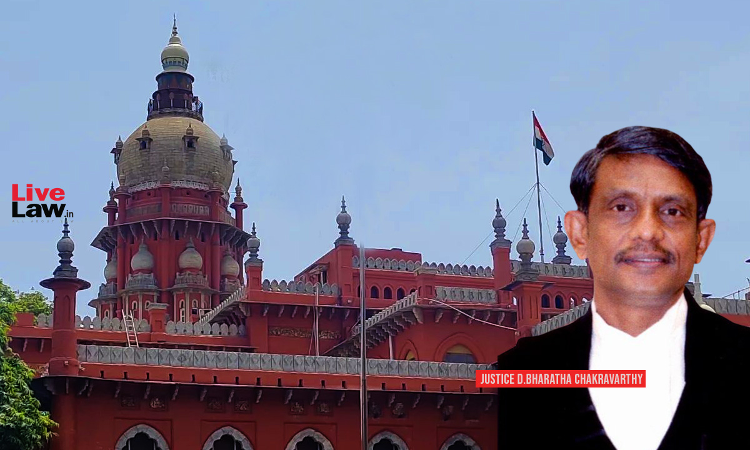- Home
- /
- High Courts
- /
- Madras High Court
- /
- Foreign National Can't Be...
Foreign National Can't Be Indefinitely Restricted In India By Issuing LOC Without Being Named As Accused In Criminal Case: Madras High Court
Upasana Sajeev
12 Jun 2025 1:45 PM IST
The Madras High Court has recently observed that a foreign national cannot be forced to stay in India indefinitely in connection with a criminal case when he is not even named as an accused in the case. The court thus directed the investigating agencies to complete the probe against a Seychelles citizen within a year and to revoke the look out circular issued against him, if no case...
The Madras High Court has recently observed that a foreign national cannot be forced to stay in India indefinitely in connection with a criminal case when he is not even named as an accused in the case.
The court thus directed the investigating agencies to complete the probe against a Seychelles citizen within a year and to revoke the look out circular issued against him, if no case was established.
"Therefore, the petitioner cannot be required to stay in India indefinitely without even being named as an accused in the criminal case. As the petitioner is a foreign national, the appropriate rules will apply once they are named as an accused. However, the investigation should be completed within a reasonable timeframe," the court said.
Justice Bharatha Chakravarthy was hearing a petition filed by Karthik Parthiban, a Seychelles citizen to quash the Look Out Circular issued against him.
The case against Parthiban was that he was involved in a financial fraud of around 500 crores. The prosecution case was that one Axcel Sunshine Limited company had borrowed Rs. 500 crores and allegedly siphoned it off to one M/s. Broadcourt Investments Limited, of which Parthiban was a director. The final report was filed by the investigating agency on December 24, 2022. Subsequently, the look out circular was issued against Parthiban, which has been continuinig since.
Noting that the investigation cannot remain pending indefinitely, the court directed the CBI to complete the investigation within an year and to revoke the look out circular, if no case was established against the petitioner. The court added that if a case was established against the petitioner, he would have to face trial and thus there would be a justification in keeping the look out circular pending.
“...the time lag must also be considered. The investigation cannot remain indefinitely pending, and it shall not extends beyond a reasonable period, so as to infringe upon the petitioner's right to life under Article 21 of the Constitution of India,” the court noted.
Parthiban argued that though he has not been named an accused in the chargesheet, a look out circular has been issued against him, which has been pending for years. He argued that his right to life under Article 21 was being impinged and that he could not be kept waiting indefinitely when there was no progress in the investigation.
He also pointed out that on previous occasions, he had approached the court for staying the look out notice and to permit him to travel abroad. He submitted that in all previous occasions, he had complied with the conditions set out by the court and had returned to India without fail.
The CBI, however, objected to the plea and submitted that it was a serious and exceptional case. The CBI argued that the amount of money involved is substantial and could even cause severe prejudice to the financial system of the country. The CBI submitted that 31 accused were involved in the case and the transactions spammed multiple jurisdictions.
The CBI pointed out that Parthiban was a citizen of Seychelles, with which India did not have an extradition treaty. It was submitted that if Parthiban was allowed to travel abroad without any conditions, it would be flight risk and it might be impossible to bring him back to the court of law. The CBI said that Parthiban was being investigated as part of further inquiry and the Look Out Circular against him could not be permanently quashed or kept in abeyance.
While the court agreed with the inhibitions put forth by the CBI and opined that the CBI was right in keeping the Look Out Circular pending, the court also acknowledged that the investigation could not remain pending indefinitely. The court added that it was the responsibility of investigating agency to prioritise the matter and complete the investigation.
The court also permitted Parthiban to travel to Malaysia to attend his brother's wedding subject to certain conditions. The court asked Parthiban to provide a fresh schedule of his travel plan and must reside only at the address specified in the undertaking.
The court also asked Parthiban to surrender his passport to the Indian High Commission in Malaysia and collect it only before his return to India. The court also asked the Indian High Commission to communicate the acknowledgement of passport surrender to the CBI.
Further, the court also directed Parthiban to execute a personal bond of Rs. 10 Lakh and provide two sureties for Rs. 10 Lakh each before the Additional Chief Metropolitan Magistrate, of which one surety must be a relative, possessing valid Indian Passport. The court thus suspended the Look Out Circular during the period of his travel to Malaysia.
Counsel for Petitioner: Mr. A. Ashwin Kumar
Counsel for Respondent: Mr. K. Srinivasan Senior Counsel for CBI cases, Mr. C. V. Shyam Sunder Senior Central Government Standing Counsel
Case Title: Karthik Parthiban v The Superintendent of Police and Others
Citation: 2025 LiveLaw (Mad) 196
Case No: W.P.No.13960 of 2025



